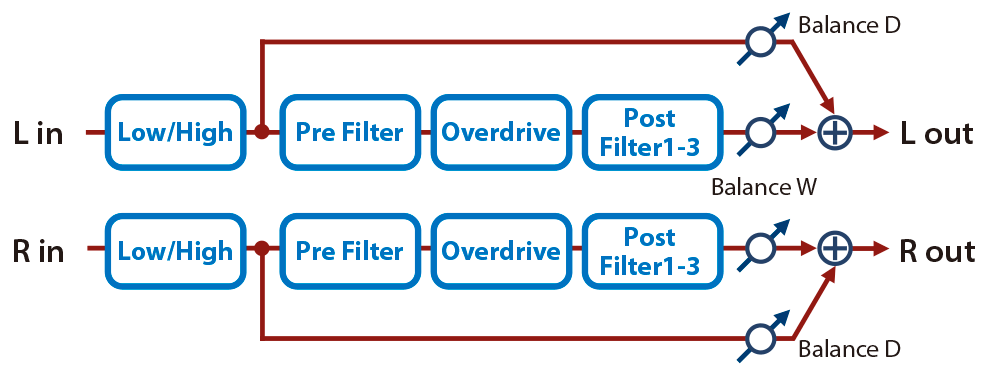This is a variety of saturator, and is distinctive for its warmer sound.

Parameter |
Value |
Explanation |
|---|---|---|
| EQ Low Frequency | 20–16000 [Hz] | Input filter (low range) |
| EQ Low Gain | -24–+24 [dB] | Amount of boost/cut |
| EQ High Slope | THRU, -12dB, -24dB | Input filter (high range) |
| EQ High Frequency | 20–16000 [Hz] | Input filter (high range) |
| DrvPre Type | THRU, LPF, HPF, LSV, HSV | Types of filter that precedes the distortion processing |
| DrvPre Frequency | 20–16000 [Hz] | Frequency at which the pre-distortion filter operates |
| DrvPre Gain | -24.0–+24.0 [dB] | For the LSV/HSV types, the amount of boost/cut |
| Drive | 0.0–+48.0 [dB] | Strength of distortion |
| DrvPost1 Type | THRU, LPF, HPF, LSV, HSV | Type of filter 1 which follows the distortion processing |
| DrvPost1 Frequency | 20–16000 [Hz] | Frequency at which post-distortion filter 1 operates |
| DrvPost1 Gain | -24.0–+24.0 [dB] | For the LSV/HSV types, the amount of boost/cut |
| DrvPost2 Type | THRU, LPF, HPF, LSV, HSV | Type of filter 2 which follows the distortion processing |
| DrvPost2 Frequency | 20–16000 [Hz] | Frequency at which post-distortion filter 2 operates |
| DrvPost2 Gain | -24.0–+24.0 [dB] | For the LSV/HSV types, the amount of boost/cut |
| DrvPost3 Type | THRU, LPF, HPF, BPF, PKG | Type of filter 3 which follows the distortion processing |
| DrvPost3 Frequency | 20–16000 [Hz] | Frequency at which post-distortion filter 3 operates |
| DrvPost3 Gain | -24.0–+24.0 [dB] | For the PKG type, the amount of boost/cut |
| DrvPost3 Q | 0.5–16.0 | Width of the frequency range affected by the filter |
| Makeup Sense | -60.0–0.0 [dB] | Adjust this value so that the sound is not made louder when distortion is applied. |
| DrvPost Gain | -48.0–+12.0 [dB] | Gain following distortion processing |
| Drive Balance (*1) | D100:0W–D0:100W | Volume balance between the dry sound (D) and effect sound (W) |
| Level | 0–127 | Output Level |
*1: This parameter corresponds to MFX Ctrl. For details, refer to “Controlling the MFX with the PAD EDIT [1] [2] Knobs (MFX Ctrl)”.
*1: This parameter corresponds to MASTER EFFECT CTRL. For details, refer to “Controlling the MASTER EFFECT with the MASTER EFFECT Knob (MASTER EFFECT CTRL)”.